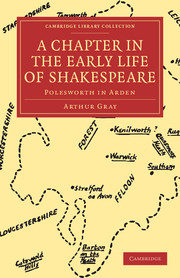Book contents
- Frontmatter
- Contents
- ILLUSTRATIONS
- SECTION 1 The Problem stated
- SECTION 2 The Marlowe fiction
- SECTION 3 The Greenwood theory
- SECTION 4 The Stratford legend
- SECTION 5 Does Shakespeare rail?
- SECTION 6 William Shakespeare, gentleman
- SECTION 7 Concerning Genius
- SECTION 8 Stratford fact and fable
- SECTION 9 The flight to London
- SECTION 10 Shakespeare's silence about Stratford
- SECTION 11 Concerning Arden
- SECTION 12 Of Poets, Patrons and Pages
- SECTION 13 What happened in 1572
- SECTION 14 Polesworth
- SECTION 15 Shakespeare in North Warwickshire
- SECTION 16 Shakespeare's road to London
- SECTION 17 Michael Drayton
- SECTION 18 The Polesworth circle
- SECTION 19 The Gooderes
- SECTION 20 The Sonnets
- SECTION 21 Southampton
- SECTION 22 Warwickshire scenes in Shakespeare's youth
- SECTION 23 The last days
- Plate section
SECTION 7 - Concerning Genius
Published online by Cambridge University Press: 07 September 2010
- Frontmatter
- Contents
- ILLUSTRATIONS
- SECTION 1 The Problem stated
- SECTION 2 The Marlowe fiction
- SECTION 3 The Greenwood theory
- SECTION 4 The Stratford legend
- SECTION 5 Does Shakespeare rail?
- SECTION 6 William Shakespeare, gentleman
- SECTION 7 Concerning Genius
- SECTION 8 Stratford fact and fable
- SECTION 9 The flight to London
- SECTION 10 Shakespeare's silence about Stratford
- SECTION 11 Concerning Arden
- SECTION 12 Of Poets, Patrons and Pages
- SECTION 13 What happened in 1572
- SECTION 14 Polesworth
- SECTION 15 Shakespeare in North Warwickshire
- SECTION 16 Shakespeare's road to London
- SECTION 17 Michael Drayton
- SECTION 18 The Polesworth circle
- SECTION 19 The Gooderes
- SECTION 20 The Sonnets
- SECTION 21 Southampton
- SECTION 22 Warwickshire scenes in Shakespeare's youth
- SECTION 23 The last days
- Plate section
Summary
‘But then,’ cries Stratford, ‘Genius! Genius defies conditions, oversteps ordinary law, works miracles.’ ‘Nothing almost sees miracles,’ I would reply, but the obstinacy of Orthodoxy, which is the denial of Faith and Reason. Genius only works with supplied materials. The Stratfordian apologist cites as exemplifying ‘the mysterious origin and miraculous processes of all poetic genius’ the cases of Chatterton, Burns, Keats, ‘and other poets of humbler status and fortune than Shakespeare.’ Who the ‘other poets’ may be I do not know. To thrust Chatterton into the company of Shakespeare is ridiculous. Burns is at home with cottars and ploughmen, very uncomfortable in Edinburgh drawing-rooms, and his stock of reading is of the smallest. The suggested parallel of Keats is most unfortunate. He was the son of a well-to-do father, and he had an excellent schooling which included Latin and French. His master was the father of his friend, Charles Cowden Clarke. He started life with books at hand and in the company of literary friends. In one respect his experience was not unlike the supposed experience of Shakespeare: for a short time he was an apprentice—but to a surgeon, not to a butcher.
A far better instance of untutored genius is that of Dickens, the circumstances of whose upbringing furnish an almost exact parallel to those of the legendary Shakespeare.
- Type
- Chapter
- Information
- A Chapter in the Early Life of ShakespearePolesworth in Arden, pp. 33 - 36Publisher: Cambridge University PressPrint publication year: 2009First published in: 1926

